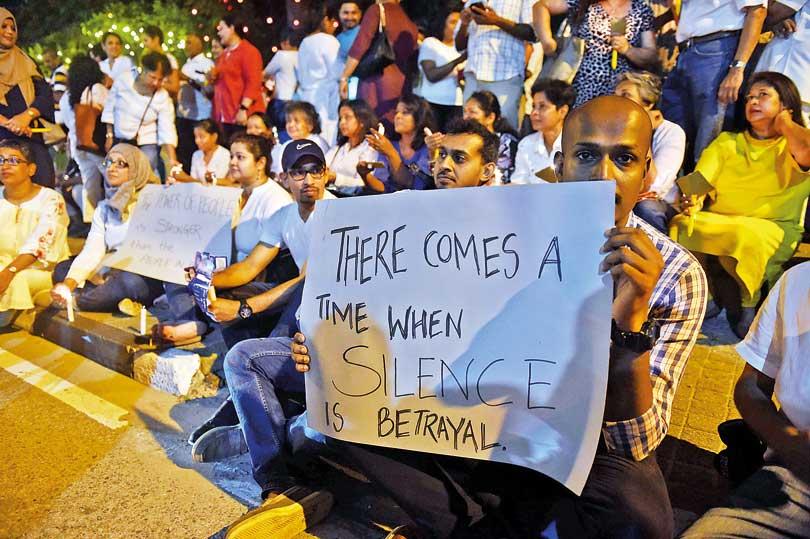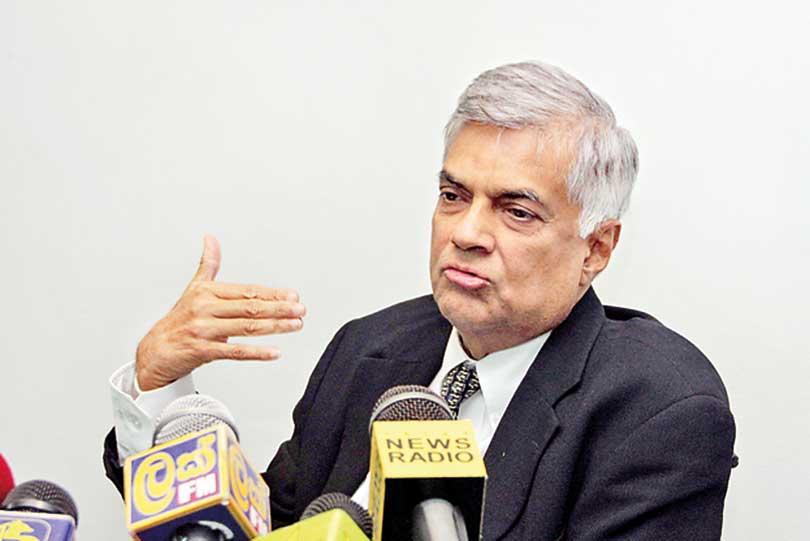11 Apr 2019 - {{hitsCtrl.values.hits}}

Supporters of Premier Ranil Wickremesinghe stage a peaceful protest after their leader was sacked by President Maithripala Sirisena in a move which many described as a coup.
 In a few days time Sri Lankans will usher in new year despite its citizens not really knowing what the future holds in store for them. There is much hype about Mahinda Rajapaksa’s brother Gotabaya being tipped to be the next presidential candidate from the ‘Pohottuwa’ party. But at the same time the majority of the country’s citizens have time and again pointed out that the presidency is something that we should do away with. In this context it leaves room for us to think whether Sri Lanka is a nation which is divided on what is right and wrong.
In a few days time Sri Lankans will usher in new year despite its citizens not really knowing what the future holds in store for them. There is much hype about Mahinda Rajapaksa’s brother Gotabaya being tipped to be the next presidential candidate from the ‘Pohottuwa’ party. But at the same time the majority of the country’s citizens have time and again pointed out that the presidency is something that we should do away with. In this context it leaves room for us to think whether Sri Lanka is a nation which is divided on what is right and wrong.
We took years to fathom what a wrong decision it was when J.R.Jayewardene amended the Constitution and made the President so powerful which prompted him to say, “the only thing now what the president can’t do is turn a woman into a man”.
During the unity Government Prime Minister Ranil Wickremesinghe proposed to bring in the 19th Amendment which has today curtailed some of the powers of the Executive. But Sri Lanka’s incumbent president Maithripala Sirisena still exercises enormous powers and has scuttled some of the moves made by Wickremesinghe which were aimed at bringing economic prosperity to the country. During the four plus years in which the Wickremesinghe regime has been in power the clashes between the premier and the president have centered around the debate about what’s good or bad for Sri Lanka.
The most recent tussle between the two was when Sirisena took steps to cancel the Sampur Coal Power Plant, days before tenders were to be called to commence the project. This was despite the Wickremesinghe Government pledging that the coal power plant would be good for Sri Lanka because it’s environment friendly.
There are also media reports which reveal that the government had incurred a loss of rupees 90 billion when purchasing airplanes, largely because the regime didn’t adhere to the advice of the president.
The Wickremesinghe ‘group’ in the government claims that its experts know their onions and adds that the country’s fluctuating fortunes can be stabilised. We can remember the political coup which was staged in October 26, 2018 where President Sirisena sacked his Premier, Wickremesinghe, and set the stage to form a new government amidst applause by the majority Sinhalese who thought it was a good move by the president. There was a party atmosphere on the roads with milk rice being served even though the rest of the globe was frowning at the decision taken by Sirisena to appoint a new premier; a decision which was termed as unethical or bad in political terms. But after that commotion and uncertainty good did prevail over bad and Wickremesinghe was reinstated as the premier.
Wickremesinghe knows how to differentiate between good and bad and this could be why this Government has survived water and power cuts, strikes and even a crucial UNHRC session in Geneva where the islanders were given two more years to implement promises included in a resolution sponsored by them.
In fact what stands in goods stead for this regime is the Third Reading of the Budget being passed in Parliament by 45 votes; 119 voting for and 74 against. Hilarious to note is the fact that the Sirisena led SLFP not voting against the Budget. This is because there are ministries under the president and they need funds to function. When it comes to funds and budgets most politicians would agree or compromise on what’s right and wrong.
During the four plus years in which the Wickremesinghe regime has been in power the clashes between the premier and the president have centered around the debate about what’s good or bad for Sri Lanka
Another issue which needs close scrutiny by the public is the involvement of China and India in social welfare work in the island. We see the slow and steady placing of China’s footprint in Sri Lankan soil. China’s latest venture on these lines is the undertaking to build 2000 houses for low income families in Colombo. This is following a request made by Premier Wickremesinghe and Speaker Karu Jayasuriya to the Chinese Government. In terms of Sirisena’s vision for Sri Lanka anything done without his approval has been labelled as ‘wrong’ and ridiculed with scorn.

At a time when most foreign countries are showing an interest in having a presence here and strengthening their foothold in strategic locations in this country, India’s contribution towards a prosperous Sri Lanka must also be watched closely. India’s latest commitment to its neighbour is the laying of foundation stones for 50 new houses that would come up in Indola Estate in Matara. India has pledged support to construct 14000 houses in Sri Lanka out of which 1000 have been completed. India has undertaken more than 70 people oriented projects in Sri Lanka and has promised the islanders a development portfolio worth US $ 3 billion. Most Sri Lankan Governments have seen as something ‘good’ when the Government of India spend lavishly on the welfare of its (Sri Lanka’s) people. Refugees from India
But this is not necessarily so at times when India decides to interfere in Sri Lanka’s domestic issues in a subtle way.
People of this country know little about the dealings the Wickremesinghe regime has with ‘New Delhi’. Very recently we read about a batch of Sri Lanka refugees, who migrated to India, making their return. These refugees comprising 26 men and 32 women will be settled in Jaffna, Mannar, Vavuniya, Trincomale and places in the Colombo district. There is sure to have been an Indian hand in this ‘happening’ because the issue of Sri Lanka’s refugees has also given the Central Government of India headaches. But overall it’s good to have our own people back because regardless of what ever arrangement has been made by the authorities of the two countries what’s positive is the refugees viewing that Sri Lanka as a good place to return to.
As TNA Leader R.Sampathan said quite rightly the other day the Sri Lankan problem is not economic, but more a muti-faceted issue. He says that the future of the country depends upon the reputation that it enjoys both domestically and internationally. In this case Sri Lanka needs to see the citizens of its divided community come to a compromise between what is good and bad for the country. After that is done we can have a debate about what approach to take to achieve what’s good within the shortest possible time. Right now the political parties are divided on the Government of Sri Lanka sponsoring a resolution at the UNHRC sessions in Geneva regarding reconciliation process. Many neutral thinkers are of the opinion that Sri Lankan lawmakers should also agree upon a mechanism which the international community agrees upon in terms of probing war crimes committed by both the tiger rebels and government troops during the civil war. Such a move would help Sri Lanka save not only its government’s face but also that of the security forces.
Sri Lanka being divided on what’s good and bad is akin to two sets of people pushing a car in the opposite direction.
26 Oct 2024 2 hours ago
26 Oct 2024 4 hours ago
26 Oct 2024 4 hours ago
26 Oct 2024 5 hours ago
26 Oct 2024 26 Oct 2024